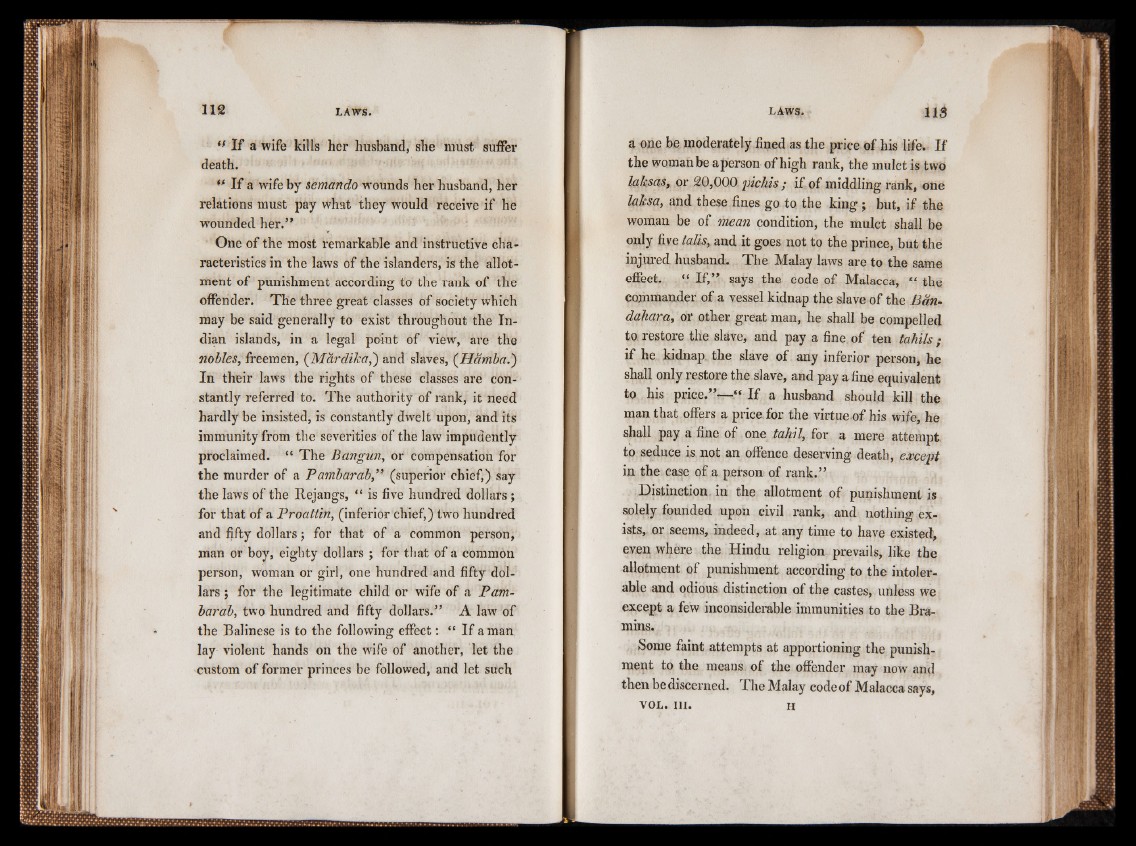
tf If a wife kills her husband, she must suffer
death.
f( If a wife by semando wounds her husband, her
relations must pay what they would receive if he
wounded her.”
One of the most remarkable and instructive characteristics
in the laws of the islanders, is the allotment
of punishment according to the rank of the
offender. The three great classes of society which
may be said generally to exist throughout the Indian
islands, in a legal point of view, are the
nobles, freemen, (Mardilca,) and slaves, (H&mba.)
In their laws the rights of these classes are constantly
referred to. The authority of rank, it need
hardly be insisted, is constantly dwelt upon, and its
immunity from the severities of the law impudently
proclaimed. “ The Bangun, or compensation for
the murder of a P am barab(superior chief,) say
the laws of the Rejangs, “ is five hundred dollars;
for that of a Proattin, (inferior chief,) two hundred
and fifty dollars; for that of a common person,
man or boy, eighty dollars ; for that of a common
person, woman or girl, one hundred and fifty dollars
; for the legitimate child or wife of a Pambarab,
two hundred and fifty dollars.” A law of
the Balinese is to the following effect: “ If a man
lay violent hands on the wife of another, let the
custom of former princes be followed, and let such
a one be moderately fined as the price of his life. If
the woman be a person of high rank, the mulct is two
lalcsas, or 20,000 pichis ; if of middling rank, one
laksa, and these fines go to the king ; but, if the
woman be of mean condition, the mulct shall be
only five tails, and it goes not to the prince, but the
injured husband. The Malay laws are to the same
effect. “ If,” says the code of Malacca, “ the
commander of a vessel kidnap the slave of the Ban-
dahara, or other great man, he shall be compelled
to restore the slave, and pay a fine of ten tahils ;
if he kidnap, the slave of any inferior person, he
shall only restore the slave, and pay a fine equivalent
to his price.”-—“ If a husband should kill the
man that offers a price, for the virtue.of his wife, he
shall pay a fine of one tahil, for a mere attempt
to seduce is not an offence deserving death, except
in the case q£ a person of rank.”
Distinction in the allotment of punishment is
solely founded upon civil rank, and nothing exists,
or seems, indeed, at any time to have existed,
even where the Hindu religion prevails, like the
allotment of punishment according to the intolerable
and odious distinction of the castes* unless we
except a few inconsiderable immunities to the Bra-
mins.
Some faint attempts at apportioning the punishment
to the means of the offender may now and
then be discerned. The Malay code of Malacca says,
VOL. III. h